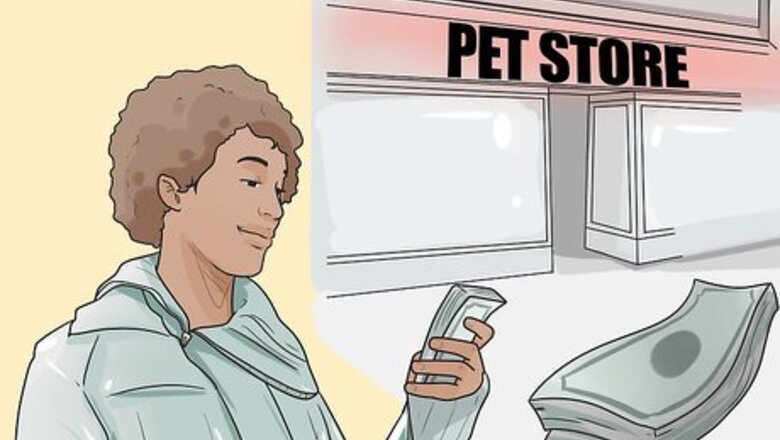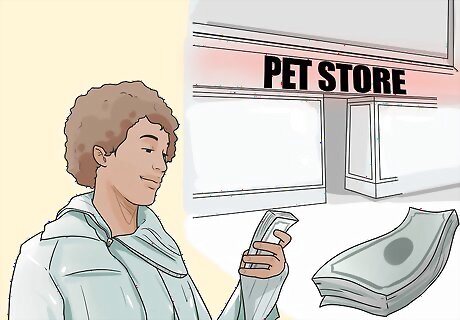
views
Determining Your Business Viability
Acquaint yourself with the pet industry. Before you begin seriously considering if you want to open a pet store, acquaint yourself with the industry. This can help you make an informed decision about whether or not this is the right path for you. The pet industry in the United States is a huge economic force: every year, people spend $35 billion on their pets. Even though the market for pets and pet supplies is significant, the success rate varies greatly on such factors as location, community participation, and even how well you run your business. You can start a variety of types of pet stores, from an onsite and/ or reseller of pet products or a full-service pet store. Also consider if you want to independently own or store or open a franchise.
Assess your abilities to care for animals and run a business. Before you begin making plans to establish a pet store, you first need to honestly assess your abilities not only to run a business, but also to take care of any animals you may want to sell. Taking an objective view of your skills can help you decide if starting pet store is the right option for you. An excellent way to assess your abilities is to compare your work to other pet stores in your area. You might even want to talk to other local pet store owners to get a sense of their business and help you think about how you can fit in with the local market. You can’t expect to be successful if you can’t compete.
Think about how a pet store will fit into your lifestyle. Knowing whether or not the time, emotional, and physical demands of being a business owner and animal care professional fit in with your lifestyle is important if you want to run a successful pet store. Consider the following questions to figure out how a pet store will work with you’re your life. Are you able to handle the physical demands? Having a pet store might require you to lift heavy equipment or boxes, stand on your feet for long periods of time, or deal with unruly animals. Are you able to handle the emotional demands? A pet store, especially in its first few years, will require significant amounts of your time and may not offer vacations or days off during the week. In addition, you may want to consider if you can handle animals that may die while in your store. Think about if being a pet store owner fits your personality. Client management is a significant part of the job and if you don’t like working with people, this may not be the right choice for you. You may also want to consider your location. If live in an isolated region or there are already multiple pet stores in your region, it may be difficult to attract clients.

Examine if owning a pet store meets your financial needs. Pet store owners can earn on average about $31,000 per year. This amount can change depending on how often and if your store is a franchise or independently owned. Only proceed with your plans if the average pay or below meets your financial needs. Remember that you will have to pay taxes and other fees for your business and that annual overhead such as insurance, pet supplies and other items can also be very costly.
Establishing Your Business
Create short- and long-term business plans. Write out short and long term plans to guide your pet store. This is important to help develop your business and accommodate for any contingency such as an illness or a lawsuit. It will also be important to show to any local authorities or financers. Be as detailed in your plan as possible. List owner’s and any employees’ responsibilities. Create a working list of services and prices that you can tailor to demand. Finally, make sure to calculate any costs you may have to take on for supplies and payroll. This is the appropriate time to decide what services you’re going to offer. You can sell only pet supplies or be a full service pet store that sells animals and pet supplies.

Start your business. You need to found a legal entity to legitimize your business before you begin your pet store. Starting your business as a legal entity, including having a marketing strategy and billing structure, can help show potential clients and financers that you are a serious businessperson. If you have any questions, consult the Small Business Administration, which was set up to help smaller companies. Make sure to register your business with the Internal Revenue Service (IRS) or other tax authorities. You may want to hire a local accountant to help you navigate the financial side of your business, from registering with the IRS to budgeting.
Obtain correct licenses, certificates, and insurance. Because you will be dealing with animals, you will require specific licenses and insurance to start your business. Check with local authorities before you start your business and then obtain any licenses, certificates, and insurance required by law to run a pet store. There are specific animal welfare laws in the United States under which your pet store will be subject. You must be licensed under the Animal Welfare Act and US Department of Agriculture (USDA) Animal and Plant Health Inspection Service (APHIS). Most state and local governments have additional legislation on animals and pet stores, so check with your regional animal care office to see what additional regulations you must observe, including licenses and fees. The USDA APHIS has a list of all regional animal care offices in the United States at https://www.aphis.usda.gov/aphis/banner/contactus/sa_animal_welfare. The Small Business Administration can also help if you have any questions. Make sure to get insurance that will cover your assets and general liability. If you have decided to have a franchise pet store, the umbrella corporation will likely help you with licensing and other issues.
Apply for financing if necessary. It can be a significant investment to start a pet store and you may need additional funds to get your business off on the right foot. Apply for financing at a local bank for sufficient funds to start your business and get you through the first few months. It’s important to have a well-developed business plan to show potential financiers. In addition, having the proper legal entity and licenses can help legitimate you and your business to banks.
Find a mentor for you and your business. Seek an experienced mentor who understands either small businesses or the pet industry. She will help grow your business and guide you through difficult times or situations. This person can offer invaluable advice on everything from pricing to dealing with difficult clients or continuing your education as a business owner.

Rent a space for your pet store. Once you’ve obtained proper financing, you will need to rent a retail space for your pet store. Renting an appropriate space will allow you to start buying supplies and get set up to make profits. You can either rent a new space or take over another pet store, which has the added benefit of coming with many supplies. Find a retail space in a high-traffic area such as a mall or near a dog park. You will need sufficient space to house animals, meet with clients, conduct your business and store your materials. You will need to make the space warm and inviting to your clients and any animals you may house. It should be clean and tidy and allow space for all to move. You may want to make sure it has plenty of natural light.

Purchase supplies. You should have listed the various supplies you need in your business plan. Once you’ve established your company, purchase supplies you need to get started as quickly as possible. This may require establishing relationships with other retailers and manufacturers. You’ll need to do a lot of research about pet supplies and what people are buying before you begin purchasing stock. This may also require researching other local pet stores. It’s also important to have a high-quality pair of scissors that will not damage fabric. You’ll need to purchase cages and aquariums that can accommodate any sized animals you may sell. Purchase supplies such as food, water dishes, toys, and any other pet supplies you may want to sell from quality and vetted manufacturers. If you are going to sell animals, you need to purchase them from a reputable dealer or breeder. Check the health credentials on each animal as well.
Set up your pet store. Before you welcome clients, you’ll need to set up your pet store space. From painting to decorating aquariums, you’ll want to make the space warm and inviting to potential clients. Consider painting the space a bright and neutral color that is easy to clean. For example, you might want to keep the store color white and allow the products and/ or animals to stand out. A mentor or professional organizer might help you to best set up the space so that it attracts clients and get them to flow effectively through the store.
Building Your Business

Offer different pet services. Many pet stores will offer different services such as grooming, animal training, and boarding. The more diversified your services, the more likely you are to be successful. If you decide to offer additional services, you’ll need to make sure you’re aware of different legal requirements and the local market. You can find this information by checking with your local regional animal care office and visiting local pet stores. Even if you offer several different services, it’s a good idea to have a service in which you specialize to help attract clients. For example, maybe you know a lot about natural pet foods and toys. Consider specializing in selling organic products. It’s important to not be too diversified. Offer several different services that you do well instead of dozens that you do marginally.
Set up a pricing structure. Set up pricing structure for your services. Knowing how much you want to charge in advance can make you appear more professional when you meet with clients. You may want to set base rates and tailor them according to how much work each individual product will cost. Be aware the large retailers may offer the same products for a lower price, so consider if and how you want to compete with them. Looking at what other pet stores or manufacturer’s suggested retail prices will give you a point of reference. Make sure your prices are commensurate with your experience and your region.

Install an invoicing and payment system. Once you know your price structure, install an invoicing and payment system. Consider the types of payment you will accept and how you will write receipts, which will help legitimize your business and make it easier to report income. Make sure to have a separate bank account for your business than you do for personal finances. Likewise, have separate credit lines for your business than you do for yourself. Make sure every aspect of your pricing and billing is transparent to clients and vendors. Maintaining fair business practices is vital to your success.
Set up a marketing strategy. Ads are often the first impression potential clients have of you and you’ll want to consider different media to attract clients. Hooking your potential customers and keeping the message simple and concise can help attract a wide array clients. If you decide to design your own ads and website, research local businesses advertising to guide your design. You want your brand to be simple, distinctive, and attractive to your clients and potential customers. Design your ads to complement your brand. Use similar color and design schemes so that clients and potential customers associate these elements with you. Partner with other businesses to advertise your pet store. You can work out a system where other local businesses or national manufacturers to display your business information in their office or on their website in exchange for putting their information in your store or on your website. Getting involved in community activities is a type of free marketing, such as sponsoring a local dog park. Donating a service or making a contribution to a charity gets your name out in the public you want to serve.

Guarantee your products and services. Guarantee the quality of your products and services. If you believe in them enough to guarantee satisfaction, potential clients may be more likely try out your business and current clients may be more likely to keep coming back.
Write informational newsletters. Staying in regular contact with your target markets by email or regular mail will keep your pet store name readily available. It can also direct clients and potential customers to your media accounts or retail space. For example, you can write a monthly or bi-monthly newsletter, but make sure to keep your information concise and the sales pitch at a minimum. Let customers know about any upcoming specials or promotions you have.
Offer specials to potential and current customers. Develop different specials or offers for clients that do not decrease your profits. Offering people an incentive can attract them to try out or return to your store. Think of something inexpensive but effective at enticing possible clients. For example, create a food buyer club. For example, for every ten bags of food purchased, a customer could receive the 11th bag free. You can also offer a discount to first time clients or on slower business days.

Encourage client referrals. Small businesses rely heavily on word-of-mouth advertising. Train employees how to build clientele through referrals and client relationships. Give a discount or upgrade on later visit to clients who refer a friend. Be sure your business cards, media sites, and ads mention how clients can "friend" you on social media sites. Mention the benefits of being a friend of your store and consider coupling this with sweepstakes and daily deals offered only through your social media sites. Develop incentive programs for referrals. For example, you can run a contest for clients who refer the most new customers by rewarding them a free bag of food or other pet supplies.

Stay on top of pet store and supply trends. Pet supplies can be a very lucrative business that is as susceptible to trends as other industries. Staying abreast of current pet store and pet supply trends can help you maintain a successful and healthy business. Read trade publications, attend continuing education, and network with other pet professional to help you stay current in your skills, services, and trends.
Sell your products online. If you want to expand your business farther, consider selling your products online. This can can help increase your profits. Your web site should present a snapshot of the experience a client will enjoy at your store. It is important that your store have a professional looking website because it can draw in potential clients and help keep your current customers. < Include sections on different services, products you sell, and any specials you offer. Structure the web site so that search engines can easily locate and bring potential clients to it.

Consider whether you want or need to hire staff to assist you. In the early stages, you may need to be the only person on staff- or you may not yet have the finances to hire staff. If you decide to hire someone to work with you, you’ll need to interview the person and make sure they are professional, experienced with animals or pet stores, and can help you grow your business.

















Comments
0 comment